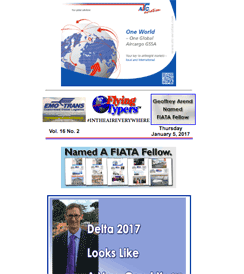

#INTHEAIREVERYWHERE
 |
 #INTHEAIREVERYWHERE |
| Vol. 16 No. 5 | Friday
January 13, 2017 |
| Smack Dab In Supply Chain Middle Mile |
AirLogistix at George Bush Intercontinental Airport in Houston, TX (IAH), adjacent to IAH's Federal Inspection Services Center and within close proximity to IAH's perishables treatment. The “middle mile” is a common term used in the broadband Internet industry to describe connectivity between the core network and the local network. While not a term common to the perishables logistics supply chain, I believe it conceptualizes a host of valuable and necessary activities performed in the middle of the supply chain that are key for safe and successful transit of perishables goods around the world. Smack Dab In The Middle
Service segmentation of first and last mile logistics
is common these days. Collection/pick-up specialists
and expert product delivery services abound, greatly
enhancing the transport of sensitive commodities
ranging from fresh produce and fish, to electronics,
to bio-med and pharma. Much of the transport connecting
first and last mile services is by air because perishables
are time/condition sensitive and of high value—a
classic profile of air cargo commodities. While one might reasonably assume that a “middle mile” in this arrangement is the air transit itself, an equally important middle mile within this supply chain is the handling on the airport. An increasingly diverse array of new products, commodities, and even individualized medical services—which depend on audited logistics—require precise and verifiable handling at every node. Airlines, forwarders, and ground handlers have made great strides in providing specific services to address the requirements, but cannot be all things to all customers at all points on the planet. Expanded OfferingsOne might ask why airlines and other parties do not offer the relevant perishables services in-house to their own customers. Many have these services in their portfolio, but not in every location or for every product specialty. Others do not wish to make the necessary capital and personnel investments to bring their facilities up to modern perishables handling specifications. Then there is the matter of expertise and the increasingly diverse certification requirements, particularly in the handling of life sciences and pharma shipments. New Horizon For AirportsWhat about airports offering these middle mile facilities? We have had this conversation with a number of airports over the past ten years, many of which have invested substantial time and due diligence money heading out to Amsterdam, Frankfurt, Hong Kong, and other world-renowned perishables cargo airports. When they go, there is certainly a lot to see and to contemplate as they try to translate those operations into something actionable at their own airport back home. There are at least two issues they must grapple with. The first and obvious one is scale—with the exception of Miami, perishables volume through North American airports does not come close to the scale of operations and volume at the airports they uphold as “best in class.” Therefore, solutions that work great at Schiphol may not be appropriate or economical at most other airports. Second, it’s not about the facility, but rather about the types and quality of services offered by the perishables specialist operating the facility. In the end, we have seen many airport efforts either never get off the ground, or fail once they did. Failures inevitably stem from two factors: impractical scale of operations and a lack of understanding of the mix of products and services appropriate for that market. Each airport and the catchment area it serves is its own ecosystem and economy. Facilities, and the services rendered within, must be finely tuned to accommodate where they are, who they are, and what their customers really need. Seeking Understanding Un-MiamiAirlogistix USA first seeks to understand the market we are in and customer needs. We joke that our airport stations seek to be the “un-Miami,” not to disparage MIA, but rather as a tip of our hat to their expertise and scale and to also express that we will right-size to our own market, our unique product mixes, and our own region and customers. In the end, it’s about offering solutions, not imitation. AirLogistix USA offers solutions through its suite of “white label” perishables handling services, which can be used by any airline, forwarder, handler, and even many buyers and sellers to directly control transport of their valuable products through the airport, ensure the integrity of the products, and include valuable additions such as on-airport quality control and packaging. Covering VulnerabilitiesThe on-airport transit of shipments is one of the most vulnerable points in the supply chain. Goods must be collected airside, brought through Customs (if import/export is involved), properly checked for quality control, and stored until the next phase of transit is available. Often some other forms of value-added kitting are also required. Often, each commodity requires a different handling protocol and these protocols may vary from customer to customer even for the same commodity. Customized and highly specialized handling is the role of the middle mile expert. Rating Middle Mile Handling
A recent Life Sciences and Pharma conference held
in London discussed a great example of why middle
mile handling is so important. Companies like Astra
Zeneca and Bayer have products and components shipped
by air all over the world. Because even minute conditional
changes can affect the quality and value of their
products, they must be monitored every step of the
way.
|
If
You Missed Any Of The Previous 3 Issues Of FlyingTypers Access complete issue by clicking on issue icon or Access specific articles by clicking on article title |
||
 Vol.
16 No. 2 Vol.
16 No. 2Delta 2017 Looks Like A Very Good Year Chuckles for January 5, 2017 It Takes A Village To Ship Air Cargo |
 Vol.
16 No. 3 Vol.
16 No. 3Turhan Özen Rides The Rocket Chuckles for January 9, 2017 Uli Uli Home Free Face To Face 2017 |
|
Publisher-Geoffrey
Arend • Managing Editor-Flossie Arend • Film Editor-Ralph Arend • Special Assignments-Sabiha Arend, Emily Arend • Advertising Sales-Judy Miller |
|